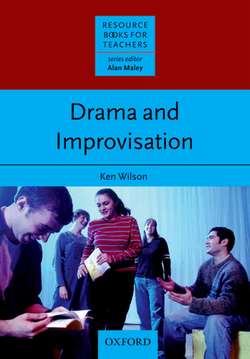Читать книгу Drama & Improvisation - Ken Wilson - Страница 2
На сайте Литреса книга снята с продажи.
Acknowledgements
ОглавлениеDuring the 1990s, my wife Dede and I did a teacher development summer school in the middle of the Hungarian plain at a place called Bugac. The course was called Drama Plus and was attended by teachers from more than 30 countries. Many of the ideas in this book were developed with the participants at Drama Plus, who then tried them out on their own students when they went home. The information gained from this international exposure to the activities is reflected in the notes relating to the material.
I have also seen inspiring work done by extra-curricular English clubs that teachers with more energy than me have started in schools all over the world. Many of these teachers make drama and performance the focus of such extra English activities. In particular, I want to pay tribute to the students and teachers who attend the annual Teenplay Drama Festival in Arad, Romania, where I was lucky enough to be president of the jury on two occasions. The work done by the teachers and students in those groups is staggeringly good, and Romania is one of the many countries where an interest in English and an interest in drama, theatre, and performance seem to go hand in hand.
My co-directors at the English Teaching Theatre, Hazel Imbert and the late Doug Case, have both had a profound influence on my drama training ideas and written work. Both Hazel and Doug were wonderful working partners, and were instrumental in the development of many of these ideas.
I am also indebted to the many ETT actors whose ideas I have been able to adapt for this book. I have been fortunate to work with some extremely talented and energetic young actors. Apart from anything else, they showed me that good actors are incredibly hard-working and dedicated people.
I want to give a special mention to two of these colleagues: Joy Harrison, an actor-director with amazing energy and an endless fund of good ideas, who has accompanied Dede and me on various ELT drama training ventures; and Richard Vranch, who was a member of both the English Teaching Theatre and the Comedy Store Players and who introduced me to the work of the Players.
The Comedy Store Players
The Comedy Store Players are a group of improvising comedy performers who are based at the Comedy Store in London. The group began in 1985, and the original line-up included Mike Myers, who was later to become internationally famous as the parody spy in the Austin Powers series of movies. Canadian Myers and an American woman comedian and actor called Kit Hollerbach brought North American improvisation ideas and taught them to an eager group of English actor/comedians.
Viola Spolin (1906–1994)
Many of the Comedy Store improvisations were inspired by the work of educator and actor-director Viola Spolin, the inventor of Theater Games.
Viola Spolin was born in Chicago and initially trained as a settlement worker, someone who helps immigrants to adapt to their new surroundings in the USA. She was aware that language communication was vital to these new Americans, and she was influenced by innovative teaching methods aimed at making groups work well together. She also found ways to use these methods to help individuals in the group feel confident enough to express their feelings.
Spolin was also interested in the way in which game structures affected the social behaviour of inner-city and immigrant children. She was particularly fascinated by the fact that children who were reluctant and resistant to normal teaching methods reacted with enthusiasm and energy if something was introduced as a game. When the children weren’t being asked to ‘learn’ something, they actually learned a lot!
In 1939, while serving as a drama supervisor in Chicago, Spolin began to devise a system of theatre training that could cross cultural and ethnic barriers. She began to develop new games that focused on individual creativity, using the concept of play to unlock the individual’s creativity and self-expression. These techniques were later to be formalized under the title Theater Games. She said, ‘The games emerged out of necessity. I didn’t sit at home and dream them up. When I had a problem with the children, I made up a game. When another problem came up, I just made up a new game.’
Her son Paul Sills developed the comic potential of these games, and opened Second City, the first improvisation comedy club in the world, in Chicago. When they opened a new club in Montreal, Canada, one of the first people to attend the show was Mike Myers, then aged 14.
